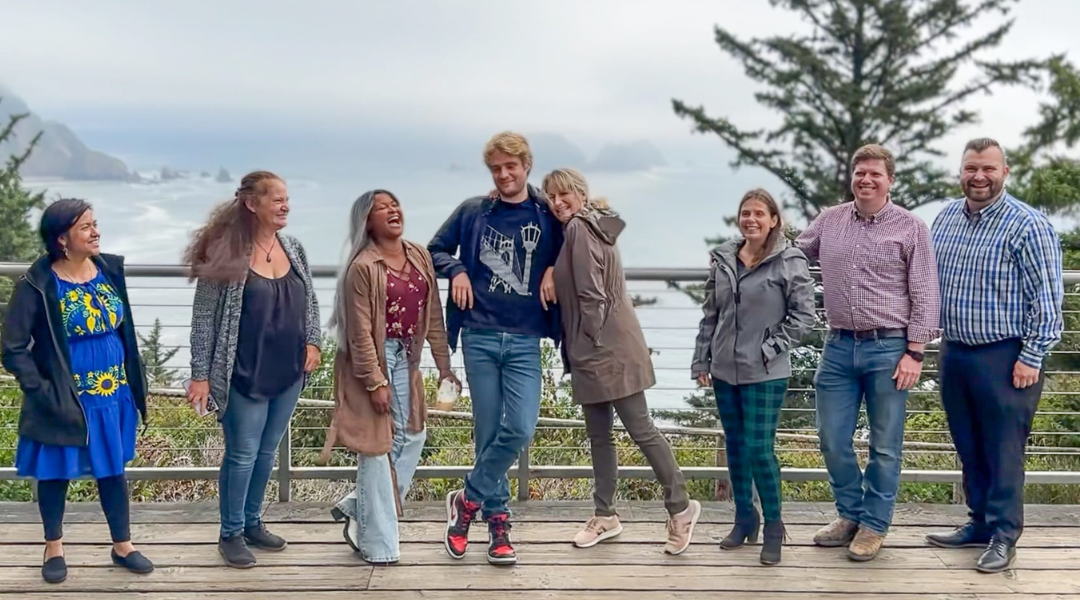
As colleagues from different generations (x/millennial), we’ve been leading talks and workshops sharing our insights about working across generations – what we call “cogeneration.” As we plan, we’re usually texting furiously, sharing ideas and reflections. So we thought we’d give others a peek into what those text convos look like. For this first one, we dug into the idea of communication itself – pretty meta.
Marci Alboher (CoGenerate VP of Narrative Change): We do best by text, so I’m starting a little text thread to see if we can unpack some of what we are learning about cross-generational collaboration. If you’re game, I’ll start us off with one of the most common questions we get during our “Cogeneration @Work” workshops which is how to build trust across generations amid a lot of generational shaming and blaming.
As the elder here and the one with a history as a writer, I’m inclined to kick us off, but recently you suggested that it might shake things up if you speak more than I do in any given situation. So that’s making me want to quickly pass the mic!
Duncan Magidson (CoGenerate Digital Communications Specialist): Thanks Marci! I think a really important element of building trust (and one that can sometimes be flattened or dismissed) is the importance of finding common ground in digital communication. I’m of the belief that a big part of the antagonism we see between older and younger has to do with the stark divide between digital natives and those who grew up in a more analogue era. I think the most illustrative example here is the tendency of older adults to type in ALL CAPS. I’ve heard this may be because it’s easier to read on a small laptop or phone screen, but, speaking as a digital native myself, capital letters instantly hit me in an emotional place. It gives me the same negative feeling as being scolded or yelled at IRL and instantly puts up an emotional shield. That’s just one example, but as I’m sure you know, the subtleties of digital etiquette are pretty intricate, from punctuation to abbreviation; it can sometimes feel almost like speaking two different languages. (I think our friends at CWP Design made a really astute point about differing interpretations of ellipses).
So, step one, (as you eloquently demonstrated in your first message), is finding common ground and naming it. For the older person, it can look like saying “I might be more comfortable on the phone or email, but I know from experience that you respond better via text.” For a younger person, it can just start with a conscious recognition of the fact that communication styles can look different for older people and that they almost certainly aren’t mad at you. 😪
Marci: I hear you. I can’t help being defensive — I don’t tend towards all-caps texting, but I’ve seen it for sure so I know it’s real. 😋 It reminds me of how we approached communicating when we first started working together. I’m pretty sure I asked you about your preferences and observed that you responded more quickly to texts than emails (generationally appropriate). But one thing I appreciate about our working relationship is that we are both cool with picking up the phone and randomly calling each other. And we prioritize any chance to grab a few hours to work together IRL and/or grab a meal. I think it’s in those real-life moments that we got more comfortable with each other & started to enjoy (as opposed to endure) working on shared projects.
Duncan: You’re definitely not an all-capser 😁 But especially when we think about larger age gaps, it’s not a dynamic to ignore!
I’m so glad you brought up our preferences and the phone calls because those quick check-ins have been so important to our working relationship. You were the person who proposed the idea of having more irregular, but common and informal calls. I have a stereotypical millennial’s knee-jerk aversion to phone calls, but having those short conversations has been incredibly valuable, both in terms of getting stuff done in our work, but maybe more importantly, in terms of developing our relationship as colleagues and friends.
In our work around generational collaboration, we talk a lot about finding common ground and making each person comfortable, but I think there’s also value in stretching yourself and finding new ways to connect. That could be a willingness to hop on the phone or joining Slack or Discord for the first time.
Marci: Maybe that’s a roundabout invite to Discord. I’m considering taking the bait. Till next time.
TAKEAWAY: Want to forge your own cogenerational partnership? Share this post with a younger or older colleague, explain your favorite medium for communication, then ask them about theirs. Follow through by using their favorite medium when you interact.
Read our next installment: Imposter Syndrome





